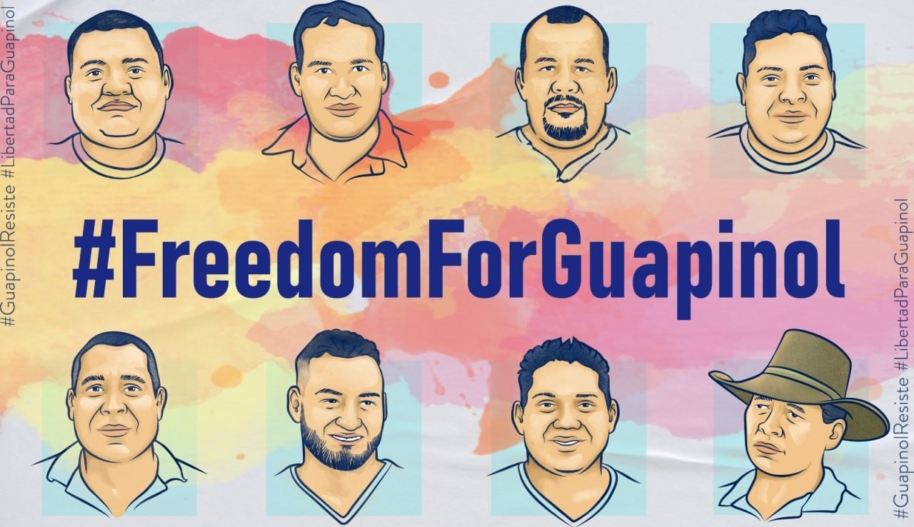José Daniel Márquez, Kelvin Alejandro Romero, José Abelino Cedillo, Porfirio Sorto Cedillo, Ewer Alexander Cedillo, Orbin Nahún Hernández, Arnol Javier Alemán and Jeremías Martínez Díaz, environmental defenders from the municipality of Tocoa in northern Honduras, known as the “Guapinol eight”,are prisoners of conscience who have been wrongfully imprisoned for more than two years solely for peacefully defending the right to clean water, Amnesty International said today.
“Having reviewed all the evidence available, including the criminal proceedings against the Guapinol eight and videos related to the case, and spoken to witnesses as well as to the human rights community in Honduras, Amnesty International considers that they are being detained only because of their activities in defense of the right to clean water and a safe environment,” said Erika Guevara-Rosas, Americas director at Amnesty International.
The eight men are part of the Municipal Committee for the Defence of Common and Public Goods (Comité Municipal en Defensa de los Bienes Comunes y Públicos, CMDBCP), an organization that has mobilized communities in and around Tocoa since 2015 to peacefully challenge the legality of iron mining concessions granted to Inversiones Los Pinares (ILP), because they argue it affects the quality of the Guapinol and San Pedro river waters. The concessions are in the protected Montaña de Botaderos Carlos Escaleras National Park.
The newly elected government of Xiomara Castro must send a clear message that the violence and criminalisation against human right defenders will not be tolerated any longer.
-Erika Guevara-Rosas, Americas director at Amnesty International
Seven of the CMDBCP members have been in pretrial detention since August 2019, accused of the crime of deprivation of liberty (privación ilegal de la libertad) and aggravated arson (incendio agravado), after they voluntarily handed themselves to judicial authorities to contest criminal charges against them arising from a protest encampment in 2018. The eighth man, Jeremias Martínez, has been detained on the same charges since November 2018.
After rigorous analysis, Amnesty International determined that the case file shows multiple flaws in the investigation, including what appears to be a lack of due diligence by the prosecutors to properly clarify the facts, conduct an impartial and independent investigation and provide concrete evidence that could link these men with the charges they are accused of. Instead, the authorities have handpicked these eight human rights and environmental defenders and actively contributed to building a narrative that the Guapinol eightare criminals, having misused the criminal justice system to keep them in pretrial detention as a way to hinder their activism. These irregularities coincide with a wider pattern of criminalization of environmental defenders that we have documented in the region for years.
In 2020, the UN Working Group on Arbitrary Detention found the detention of the human rights defenders to be arbitrary and called for their immediate release. Nevertheless, the Honduran authorities have refused to recognise the injustice inflicted on the men and their families, or to remedy the situation.
The Honduran authorities must urgently put an end to these unfair practices that jeopardise the right to defend human rights.
-Erika Guevara-Rosas, Americas director at Amnesty International
The trial of the Guapinol eight begins immediately after the presidential elections in Honduras.
“The newly elected government of Xiomara Castro must send a clear message that the violence and criminalisation against human right defenders will not be tolerated any longer. This context offers the opportunity to break this cycle of attacks against environmental and other human rights defenders. Amnesty International demands the immediate and unconditional release of these eight prisoners of conscience and calls on the Attorney General’s Office to drop the charges against them,” said Erika Guevara-Rosas.
“Unfortunately, in Honduras, those who speak out and protest to protect the environment face frequent threats and attacks, as in the murder of Berta Cáceres, or unjust criminalization, particularly where powerful vested economic interests are involved. The authorities continue to misuse the criminal justice system to silence and imprison human rights defenders. The Honduran authorities must urgently put an end to these unfair practices that jeopardise the right to defend human rights.”
More information
Amnesty International defines as prisoners of conscience people who are imprisoned or subjected to other restrictions on their liberty due to their religious, political or other beliefs, their ethnic origin, sex, colour, language, national or social origin, sexual orientation or gender identity, or other status, and that have not used violence or advocated violence and hatred.
In 2018, as construction work on the mining project began to impact the Guapinol and San Pedro rivers, local residents joined the CMDBCP to demand that national and local authorities respond to their concerns, filing legal actions and holding protests. As the authorities failed to respond, the CMDBCP established a protest encampment on the access road to the mines. The peaceful encampment lasted for 88 days, with local communities, church pastoral activists and other civil society organizations all participating. Negotiations were held with government officials, but in October 2018, the police and the military violently evicted those in the encampment.
The prosecution case against the eight defenders relates to a dispute that took place on 7 September 2018 near to a protest encampment, in which a ILP security staff reportedly shot one of the protesters and in response, protesters retained a contractor before handing him over to police. The shooting of the protester was never investigated, but the ILP reported the retention of the contractor and the burning of a rented car and two ILP shipping containers during the disturbances.
For more information or to arrange an interview, contact: duncan.tucker@amnesty.org













